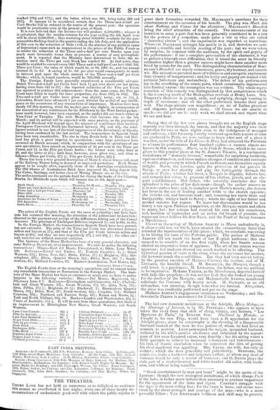Seeing that of the few new pieces brought out on
the English stage scarcely one lives through the season, and that the majority owe their toleration for two or three nights even to the indulgence of manager and audience, while fur every novelty ventured upon here a score at least are produced in Paris, we were curious to learn what sort of a piece it was that, under the title of La Grace de Dieu, had attracted the Parisians to witness its performance four hundred nights—a success almost un- known in this country. Marie, ou la Perle de Savoie, which is the name given to this popular piece at the St. James's Theatre, is a sentimental melodrama of " domestic interest," remarkable for surprising incidents, equivocal situa,ions, and those sudden changes of condition and contrasts of wealth and poverty in which French audiences and dramatists equally delight. Marie, the heroine, quits the protection of her parents in Savoy, to save her chastity and play the hurdygurdy through the streets of Paris ; whither her lover, a Marquis in disguise, follows her, and rewards her virtue by presents of fine clothes, jewels, and an ele- gant establishment. Her father, who naturally concludes that this splendour is the price of her dishonour—though the author assures us it is not—curses her ; and, to complete poor Marie's misery, she detects her lover in the act of leading another bride to the church opposite: she shrieks out, and becomes mad ; and, resuming her rustic dress and hurdygurdy, trudges back to Savoy ; where the sight of her father and mother restores her reason. To leave her disconsolate would be too heavy a tax upon Parisian sympathies, so the Marquis enters and offers to marry her : her scream had reacted his ears and his conscience, and, heedless of reproaches and an action for breach of promise, the repentant lover follows his first flame, and the Pearl of Savoy becomes a Marchioness.
Clever as the acting of Madame ALBERT in Marie undoubtedly is, it alone could not, we think, have created the extraordinary furor that attended the representation of this piece; which, we conclude, was owing to its hitting the taste of the Parisian public. The pathos of Madame ALBERT did not touch the heart of her English audience : this she seemed to be sensible of on the first night, when her frantic scream elicited no responsive burst of applause. The art of the actress was too apparent : her madness showed too much method to be affecting. The hysterical passion of tears at the close, when she embraces her mother, did however touch the sensibilities. But they had been moved before, by the genuine emotion of Madame CROSET, the mother, and of M. LIENARD, the humble friend. M. RHOZEVIL, the Marquis, though a cold lover, is a gentleman ; M. LEMADRE, the father, was too artificial to be impressive. Madame TALIER, as the Marchioness, deported herself with lady-like propriety—it was not her fault that she looked too young for the mother of the Marquis ; and Mademoiselle AVENEL manifested solicitude for l'estomac with hearty relish. M. GAMARD, as an old debauchee, was amusing, though somewhat too farcical. Altogether, the piece was creditably performed and put on the stage.
Madame ALBERT'S engagement terminates on Wednesday ; and Ma- demoiselle PLESSY is announced for Friday next.


























 Previous page
Previous page